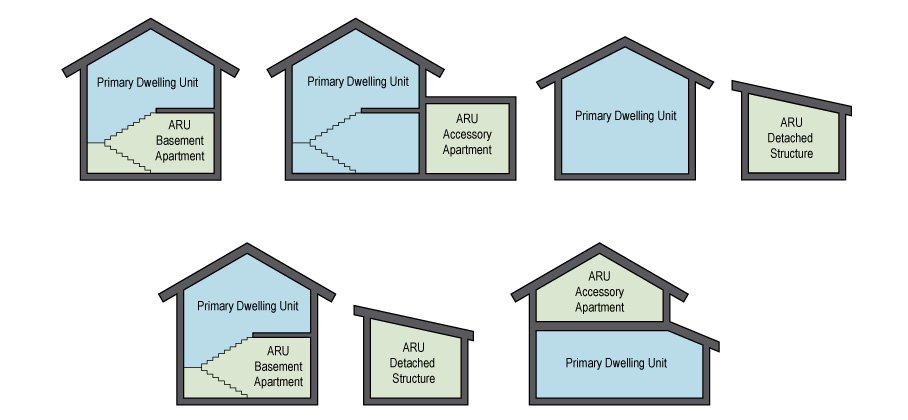
Additional Residential Units
In 2022, the Province of Ontario published the Housing Affordability Task Force Report which provided several recommendations to increase the supply of housing. One of the key recommendations encourages the development of Additional Residential Units (ARUs) as a housing option.
Below is information and frequently asked questions about Additional Residential Units or ARUs:
What are ARUs?
ARUs are separate units with their own kitchen, bathroom and sleeping area(s). ARUs are different from other residential uses because they are clearly secondary to the main dwelling on the property in terms of use and appearance. ARUs come in a variety of forms including granny flats, in-law suites, secondary suites, basement apartments, coach houses and tiny homes. Up to three (3) units on each residential lot including the primary unit may be permitted subject to compliance. They can be located in a main dwelling including a single-detached, semi-detached or townhouse dwelling, and/or in a detached structure like a garage. Below are graphic examples of ARUs:

Is a planning approval required?
If your property is serviced by municipal water and sanitary sewers, no planning approval is required to establish an ARU provided you can meet all zoning requirements.
If your property is not serviced by municipal water and sanitary sewers, an Application for Zoning By-law Amendment is required. Should Council pass a Zoning By-law Amendment to permit an ARU, their decision is final in that there is no right of appeal to the Ontario Land Tribunal.
What permits are required?
To establish an ARU, you will need a building permit from the Municipality.
You will also need a permit from the Electrical Safety Authority (ESA). A permit from the Conservation Authority may also be required should your property be located in a regulated area.
Is an ARU subject to development charges?
ARUs are exempt from development charges.
What are the requirements for parking?
No more than one (1) off-street parking space is required for each ARU.
Can I rent out an ARU?
The Municipality has generally no authority over the occupants of a dwelling including whether the ARU is owner occupied or tenant occupied.
How will my property taxes be affected?
An increase in property taxes would be generally based on the Municipal Property Assessment Corporation’s (MPAC) assessment of your property.
Additional resources
The Province has provided a guide to help homeowners plan and build ARUs and is available through the following link: https://www.ontario.ca/page/add-second-unit-your-house.